13 Best Herbal Tinctures For Acne
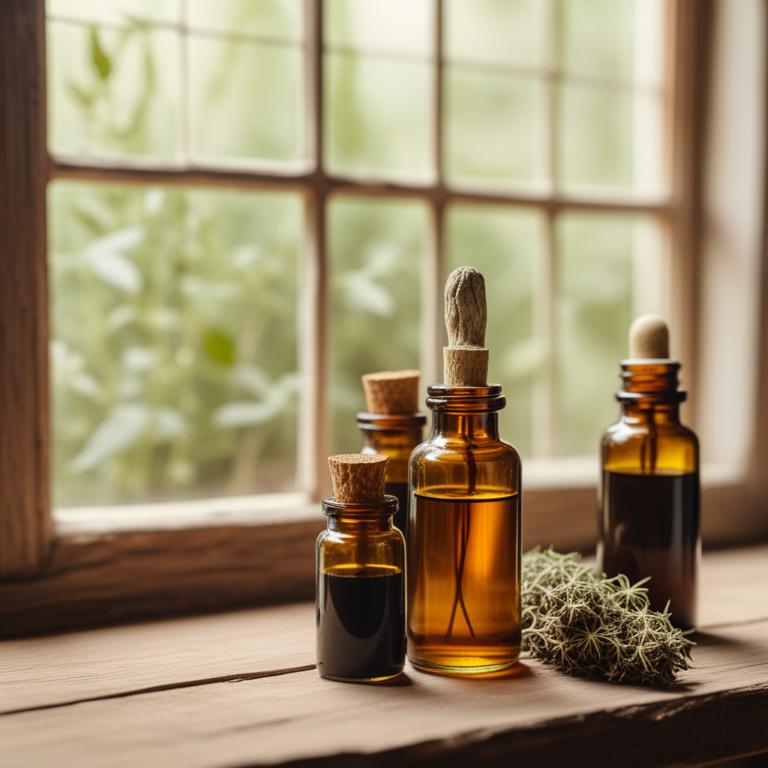
Herbal tinctures for Acne are liquid extracts obtained from plants and herbs that have been used for centuries to treat and prevent acne.
These natural remedies have several benefits, including being non-invasive, free of harsh chemicals, and gentle on the skin.
Examples of herbal tinctures that can be used to treat acne include Tea Tree Oil, which has antibacterial properties that help to reduce inflammation and kill bacteria that cause acne; Neem, which has anti-inflammatory properties that help to reduce redness and swelling; Aloe Vera, which has soothing and calming properties that help to reduce irritation and promote healing; Chamomile, which has anti-inflammatory properties that help to reduce redness and soothe the skin; and Lavender, which has antibacterial properties that help to reduce acne and promote relaxation.
By incorporating these herbal tinctures into a skincare routine, individuals can experience improved skin health, reduced acne severity, and a more natural and holistic approach to managing this common skin condition.
According to "RSC advances", tinctures for acne can be formulated using the extracted phytochemicals from plants, such as terpenes, terpenoids, flavonoids, alkaloids, phenolic compounds, saponins, tannins, and essential oils, which have antibacterial, antioxidant, anti-inflammatory, keratolytic and sebum-reducing properties to help treat the condition.
Below there's a list of the 13 best herbal tinctures for acne.
- 1. Ginkgo biloba tinctures
- 2. Aloe vera tinctures
- 3. Melaleuca alternifolia tinctures
- 4. Curcuma longa tinctures
- 5. Calendula officinalis tinctures
- 6. Silybum marianum tinctures
- 7. Cinchona officinalis tinctures
- 8. Salix alba tinctures
- 9. Eucalyptus globulus tinctures
- 10. Zea mays tinctures
- 11. Hamamelis virginiana tinctures
- 12. Allium sativum tinctures
- 13. Zingiber officinale tinctures
Also you may be interested in...
TODAY'S FREE BOUNDLE
Herb Drying Checklist + Herbal Tea Shopping List + Medicinal Herbs Flashcards
Enter you best email address below to receive this bundle (3 product valued $19.95) for FREE + exclusive access to The Aphotecary Letter.
$19.95 -> $0.00
1. Ginkgo biloba tinctures

Ginkgo biloba tinctures have been traditionally used to treat acne due to their anti-inflammatory and antioxidant properties, which help to reduce redness and inflammation associated with the ailment.
The bioactive constituents of Ginkgo biloba, including flavonoids and bilobalide, have been shown to exhibit antibacterial properties that help to combat the underlying bacterial causes of acne.
By reducing inflammation and combating bacterial overgrowth, Ginkgo biloba tinctures can help to improve the overall appearance of the skin and reduce the severity of acne symptoms.
Regular use of Ginkgo biloba tinctures may also help to promote skin health and reduce the risk of scarring associated with acne.
2. Aloe vera tinctures
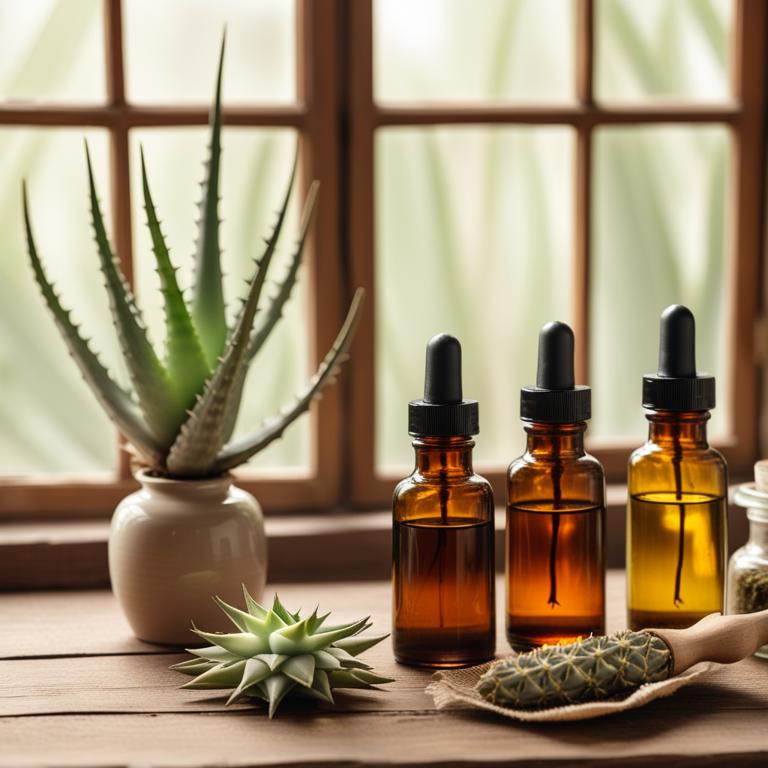
Aloe vera tinctures have been widely used to treat acne due to their anti-inflammatory, antibacterial, and antiseptic properties.
The tannins, anthraquinones, and glycosides present in aloe vera help to reduce inflammation and combat bacterial growth, thereby alleviating acne symptoms.
By inhibiting the production of pro-inflammatory mediators and promoting wound healing, aloe vera tinctures effectively treat acne and prevent further breakouts.
The benefits of using aloe vera tinctures for acne treatment include reduced redness, fewer scars, and a more even skin tone, making it a popular natural remedy among those seeking effective and gentle skincare solutions.
3. Melaleuca alternifolia tinctures
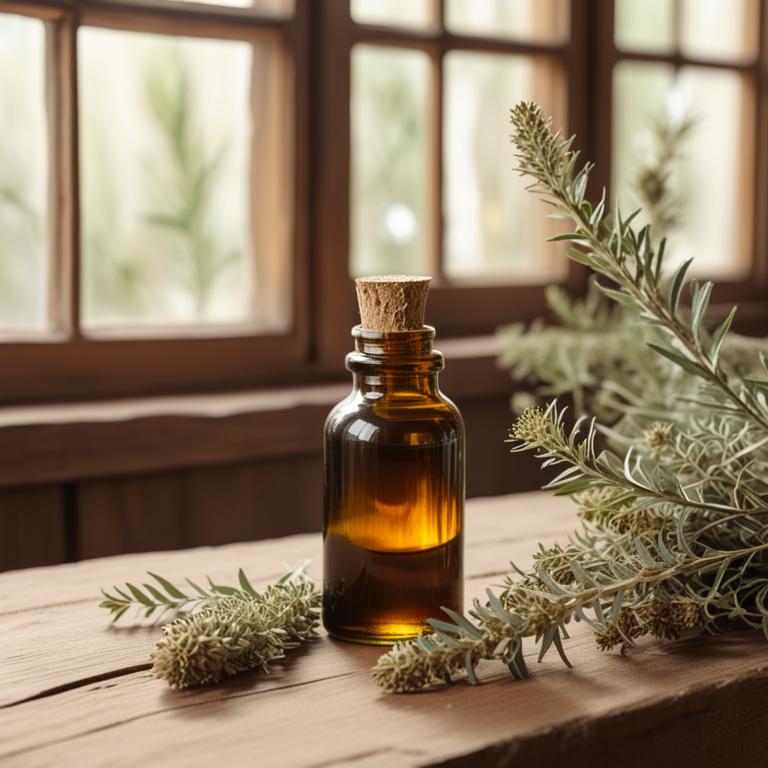
Melaleuca alternifolia tinctures have been traditionally used to treat acne due to their antimicrobial, anti-inflammatory, and antiseptic properties, which help to reduce the severity and occurrence of acne lesions.
The bioactive constituents present in these tinctures, including cineole, limonene, and linalool, work together to combat the root causes of acne, such as bacterial infections and inflammation.
By using Melaleuca alternifolia tinctures, individuals can experience benefits such as reduced redness and swelling, improved skin tone, and a decrease in the production of sebum, which can clog pores and lead to acne.
Regular use of these tinctures can also promote overall skin health and prevent future breakouts, making them a popular natural remedy for acne treatment.
Related Study
According to "American journal of clinical dermatology", Melaleuca alternifolia tinctures for acne may have the potential to become a standard treatment due to its promising properties in clinical trials.
4. Curcuma longa tinctures

Curcuma longa tinctures have been traditionally used to treat acne due to their anti-inflammatory and antibacterial properties, which help to reduce inflammation and combat bacterial overgrowth that can contribute to acne.
The bioactive constituents, including curcuminoids, demethoxycurcumin, and bisdemethoxycurcumin, exhibit potent antioxidant and anti-inflammatory effects, which aid in the reduction of acne severity and promotion of skin health.
Curcuma longa tinctures help to treat acne by reducing the production of pro-inflammatory cytokines, inhibiting the growth of Propionibacterium acnes (P. acnes), and improving skin elasticity and texture.
The benefits of using Curcuma longa tinctures to treat acne include reduced redness and inflammation, improved skin clarity, and a decrease in the occurrence of acne lesions.
Related Study
According to "Journal of integrative medicine", Curcuma longa tinctures may be beneficial for acne as it has anti-oxidant, anti-inflammatory, and wound-healing properties, which can help reduce redness and inflammation associated with acne.
5. Calendula officinalis tinctures
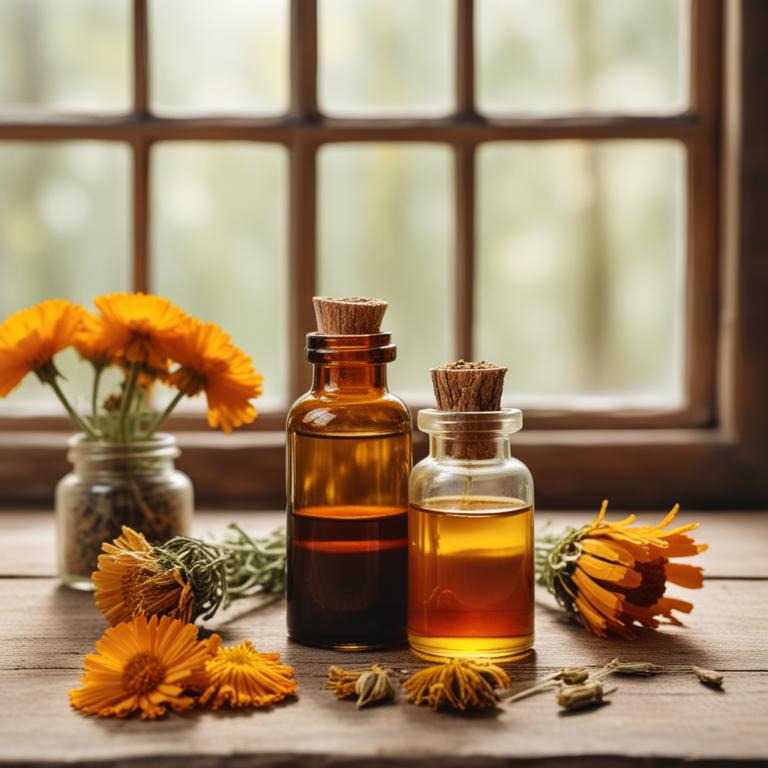
Calendula officinalis tinctures have been traditionally used to treat acne due to their anti-inflammatory, antiseptic, and antimicrobial properties, which help to reduce redness, prevent infection, and eliminate bacteria that cause breakouts.
This herbal preparation is effective in treating acne because it helps to reduce inflammation, promote wound healing, and prevent scarring, thereby improving skin appearance and texture.
The bioactive constituents of Calendula officinalis tinctures, including triterpenoid saponins, flavonoids, and carotenoids, are responsible for its therapeutic effects, including antioxidant and anti-inflammatory activities that help to soothe and calm the skin.
Regular use of Calendula officinalis tinctures can provide numerous benefits in treating acne, including reduced inflammation, improved skin tone, and a lower risk of scarring and post-inflammatory hyperpigmentation.
Related Study
According to "BMC Veterinary Research", Calendula officinalis tinctures for acne may be beneficial due to their antibacterial and antifungal effects, which can help in treating skin diseases including acne.
6. Silybum marianum tinctures
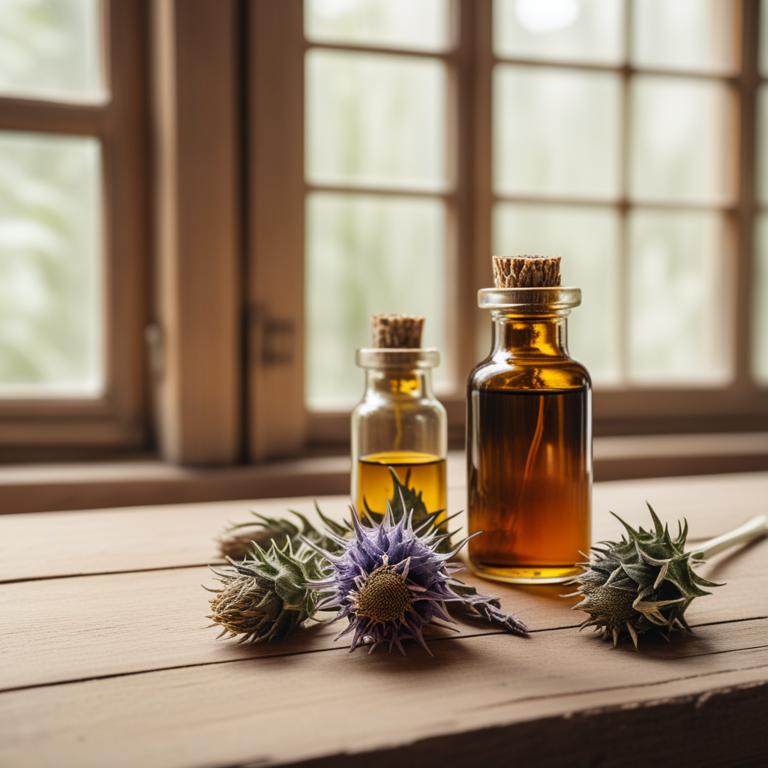
Silybum marianum tinctures, also known as milk thistle tinctures, have been traditionally used to treat acne due to their anti-inflammatory and antioxidant properties.
The bioactive constituents present in Silybum marianum, including flavonolignans such as silymarin, help to reduce inflammation and prevent oxidative stress, which can contribute to acne development.
By reducing inflammation and preventing oxidative stress, Silybum marianum tinctures can help to clear up acne lesions and prevent further breakouts.
The benefits of using Silybum marianum tinctures to treat acne include reducing redness, preventing scarring, and promoting overall skin health.
7. Cinchona officinalis tinctures

Cinchona officinalis tinctures have been used to treat acne due to their anti-inflammatory, antibacterial, and antiseptic properties, which help to reduce redness and prevent infection in the affected areas.
The tannins and quinine present in Cinchona officinalis tinctures help to treat acne by reducing inflammation, killing bacteria that cause acne, and promoting wound healing.
The bioactive constituents of Cinchona officinalis tinctures, including quinovic acids and anthraquinones, also contribute to their acne-fighting properties by inhibiting the growth of acne-causing bacteria and reducing sebum production.
By using Cinchona officinalis tinctures, individuals can benefit from reduced inflammation, fewer breakouts, and improved skin tone, making it a natural and effective solution for treating acne.
8. Salix alba tinctures
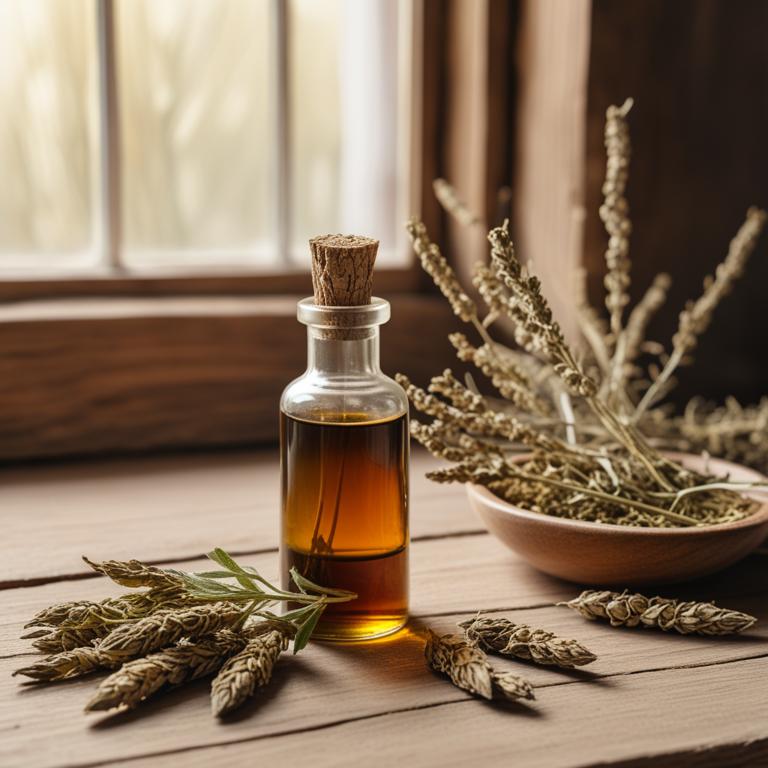
Salix alba tinctures, derived from the white willow tree, have been traditionally used to treat acne due to their anti-inflammatory and antimicrobial properties.
The bioactive constituents present in Salix alba tinctures, including salicin and flavonoids, help to reduce inflammation and prevent bacterial growth that can contribute to acne.
By inhibiting the production of pro-inflammatory cytokines and promoting the healing of skin lesions, Salix alba tinctures can help to alleviate symptoms of acne, such as redness and swelling.
The benefits of using Salix alba tinctures to treat acne include reduced inflammation, improved skin clarity, and a lower risk of scarring.
9. Eucalyptus globulus tinctures
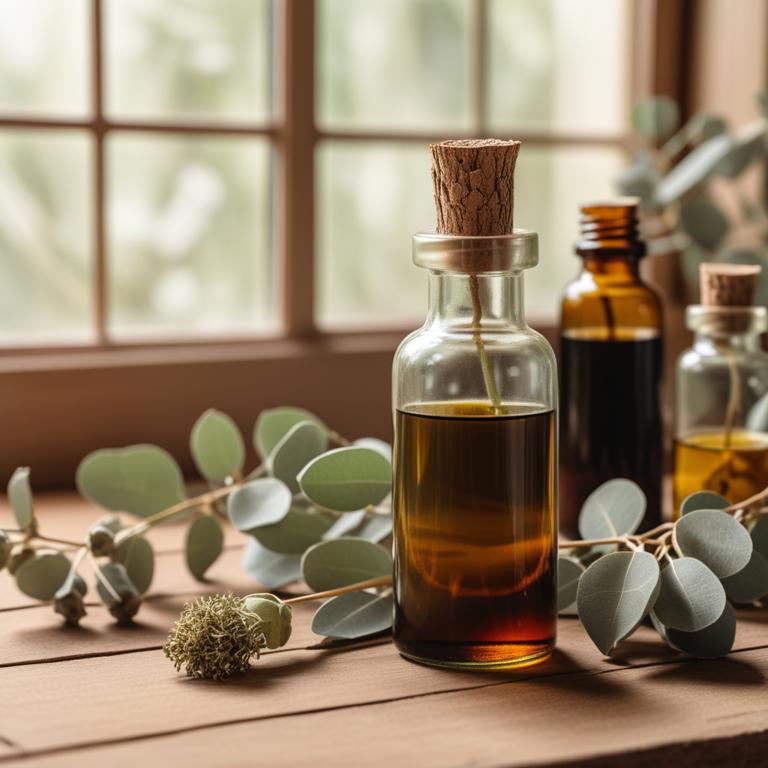
Eucalyptus globulus tinctures have been traditionally used to treat acne due to their anti-inflammatory, antimicrobial, and antioxidant properties.
The bioactive constituents, including cineole and eucalyptol, help to reduce inflammation and prevent bacterial growth, thereby treating acne.
Eucalyptus globulus tinctures can help to treat acne by reducing redness, swelling, and the severity of acne lesions.
The benefits of using eucalyptus globulus tinctures to treat acne include reduced risk of scarring, improved skin health, and a natural alternative to conventional treatments.
10. Zea mays tinctures

Zea mays tinctures have been traditionally used to treat acne due to its anti-inflammatory and antioxidant properties.
This herbal preparation helps to treat acne by reducing inflammation and preventing the growth of bacteria that cause breakouts.
The bioactive constituents of Zea mays tinctures, including flavonoids and phenolic acids, have been shown to have antimicrobial and astringent effects, which contribute to its acne-fighting properties.
The benefits of using Zea mays tinctures to treat acne include reduced redness and inflammation, improved skin clarity, and a lower risk of scarring, making it a natural and effective alternative to conventional treatments.
11. Hamamelis virginiana tinctures
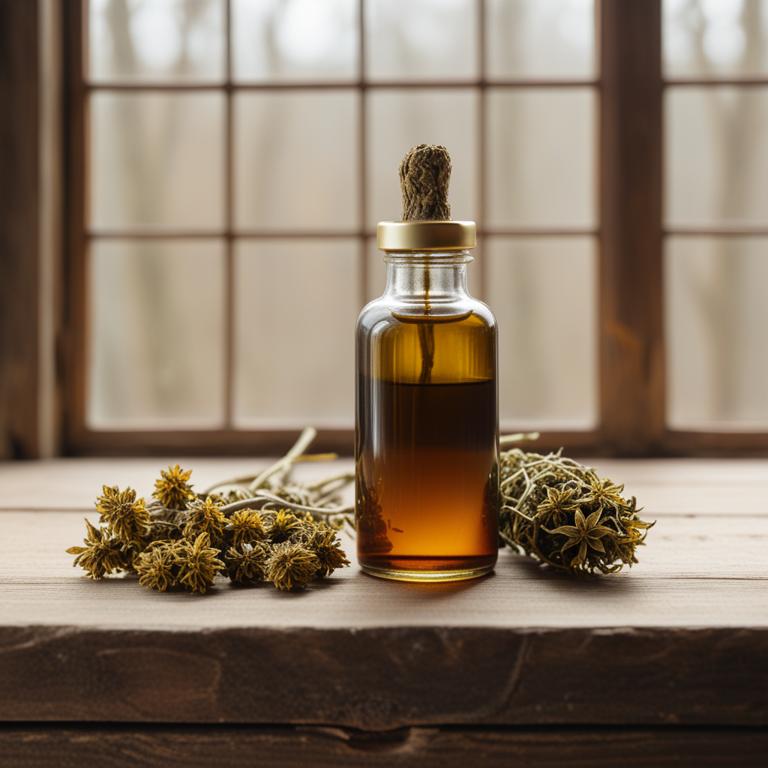
Hamamelis virginiana tinctures have been traditionally used to treat acne due to their anti-inflammatory, antimicrobial, and antiseptic properties.
The astringent properties of this herbal preparation help to reduce the size of pores, thereby preventing oil and bacteria from clogging them, which is a primary cause of acne.
The bioactive constituents of Hamamelis virginiana, including hamamelitannin and gallic acid, exhibit potent antioxidant and antimicrobial activities that help to reduce inflammation and kill bacteria that cause acne.
The benefits of using Hamamelis virginiana tinctures to treat acne include reduced redness, swelling, and severity of breakouts, as well as improved skin tone and a reduced risk of scarring.
12. Allium sativum tinctures
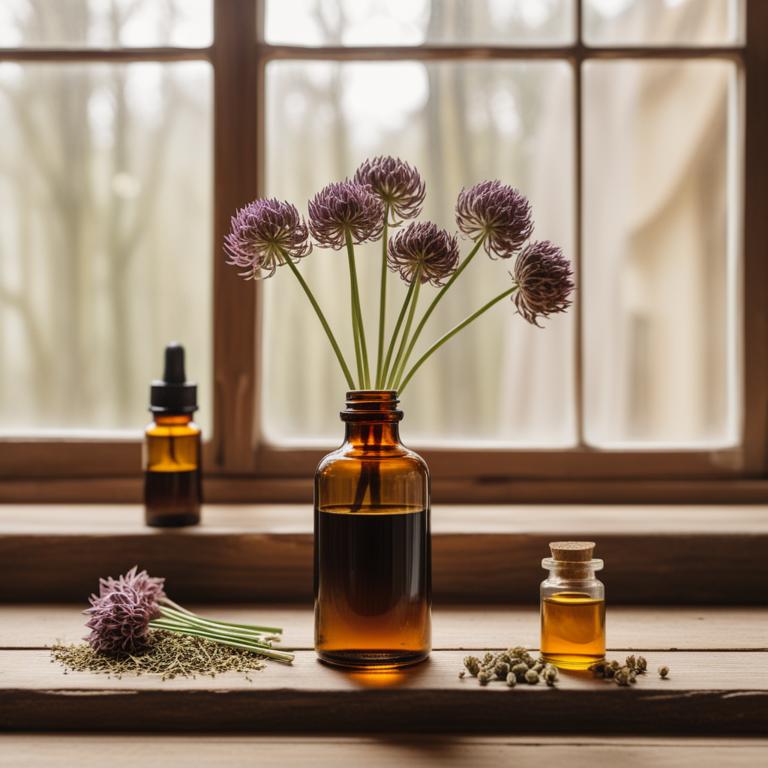
Allium sativum tinctures, derived from garlic, have been traditionally used to treat acne due to their antimicrobial and anti-inflammatory properties.
The active compounds present in these tinctures, such as allicin and diallyl disulfide, help to combat bacterial overgrowth and reduce inflammation associated with acne.
These bioactive constituents inhibit the growth of Propionibacterium acnes (P. acnes) bacteria, which contribute to the development of acne lesions.
Regular use of Allium sativum tinctures may help to alleviate acne symptoms and promote healthy skin by reducing inflammation and preventing bacterial infections.
13. Zingiber officinale tinctures

Zingiber officinale tinctures, derived from the rhizomes of the ginger plant, have been traditionally used to treat various skin conditions, including acne.
The anti-inflammatory and antimicrobial properties of Zingiber officinale tinctures help to reduce inflammation and combat bacterial overgrowth, two key factors contributing to acne.
The bioactive constituents, including gingerols and shogaols, exhibit potent antioxidant and anti-inflammatory activities, which aid in soothing the skin and reducing acne severity.
By using Zingiber officinale tinctures, individuals can benefit from reduced acne symptoms, improved skin texture, and a lower risk of scarring.